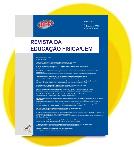Associação entre fatores precoces e medidas da atividade física por acelerometria em crianças de 5 a 7 anos de idade
Resumo
O presente estudo tem como objetivo verificar se existe associação entre fatores precoces (peso ao nascer, amamentação exclusiva ao seio, ordem de nascimento e nascimento pré-termo) e as medidas da atividade física por acelerometria em crianças de 5 a 7 anos. Trata-se de um estudo transversal realizado com crianças de escolas públicas e privadas do Recife. Utilizou-se um questionário com os pais/mães das crianças. Das 784 crianças participantes do estudo, 491 tiveram, pelo menos, três dias de monitoramento válido. Identificou-se que as crianças que eram classificadas como o quarto filho ou superior apresentaram 83% menos chance de ter baixo percentual de tempo diário despendido em atividades físicas em intensidade moderada quando comparadas as que eram o filho primogênito (OR= 0,17; 0,03-0,80). Verificou-se que somente a ordem de nascimento foi negativamente associada ao baixo percentual de tempo diário despendido em atividades físicas em intensidade moderada, mesmo após ajustamente para os fatores de confusão.
Downloads
Copyright (c) 2020 Journal of Physical Education

This work is licensed under a Creative Commons Attribution-NonCommercial-NoDerivatives 4.0 International License.
•Os autores detém os direitos autorais, permitindo citações de seu conteúdo em outros veículos de informações científicas e técnicas.

Este obra está licenciado com uma Licença Creative Commons Atribuição 4.0 Internacional.













_1502.jpg)











